Review: Shark Tank: The Game
Publisher: Cardinal
Year: 2016
Tagline: Only the strong will survive.
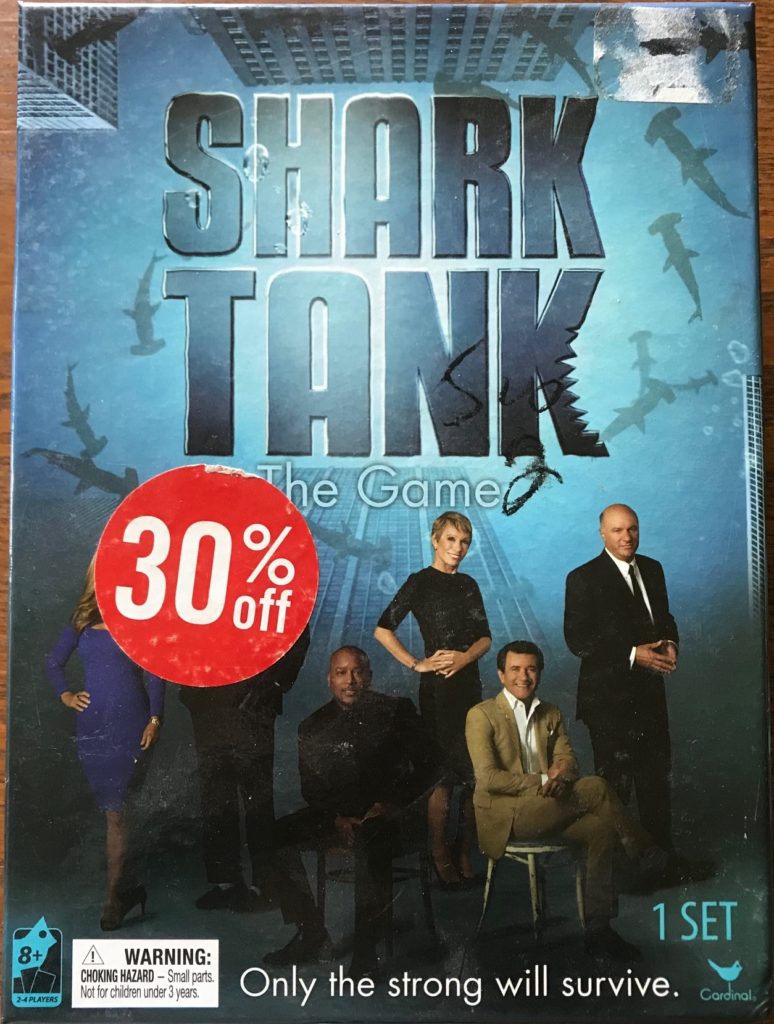
how we met
Shark Tank: The Game is not some super find. My local farm store carries it on the shelves brand new. I have seen it at thrift numerous times. But the thing is, I really like the TV show Shark Tank. And eventually Bill started watching too when I had it on. Now when we eat dinner we sometimes throw on an episode. So with a couple of us prepared to compare the game to the television show, how could I say no?
how it plays
The goal of Shark Tank: The Game is very similar to the goal of Shark Tank: walk away with the most money.
Each player gets a SHARK coaster and corresponding chips. They also get an I’M OUT card and one million dollars in specific denominations. The SHARK coaster will explain your shark identity and, similar to another reality show board game Storage Wars, each SHARK has their own specialty to represent their expertise. You get bonuses if you win the honor of backing an idea in that area.
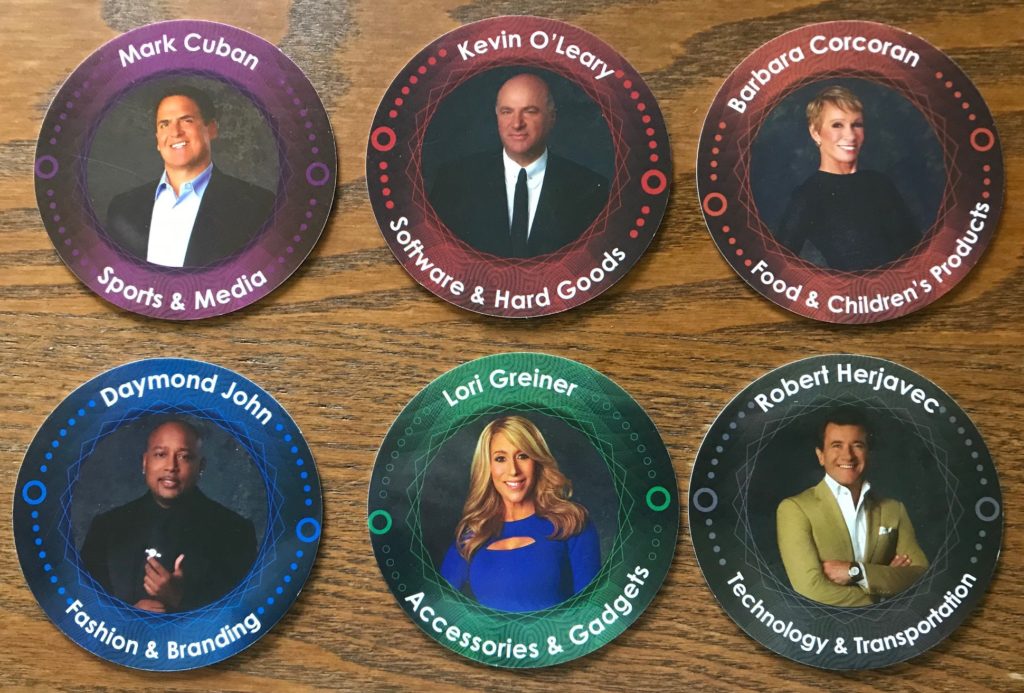
To set up for play, place 6 COMPANY CARDS face down in the middle of the table. The game will end when each of these COMPANY CARDS has been pitched. One player acts as the READER (this role will pass to the next player for each pitch). The READER will choose one of the face down COMPANY CARDS and read the title and description only. The company type and worth info must remain secret until after bidding ends, which takes place over two rounds:
- Round 1: Wagers are made in order, clockwise from the reader. Players bid openly using their money cards face up.
- Round 2: This round is secret, and players bid with their money cards face down.
The highest bid wins the company. All wagers that were placed are put at the bottom of the money deck, so those wagers are the real deal. At any point if a player does not want to bid, they simply place their I’M OUT card for the other sharks to see. They are out of bidding for that company.
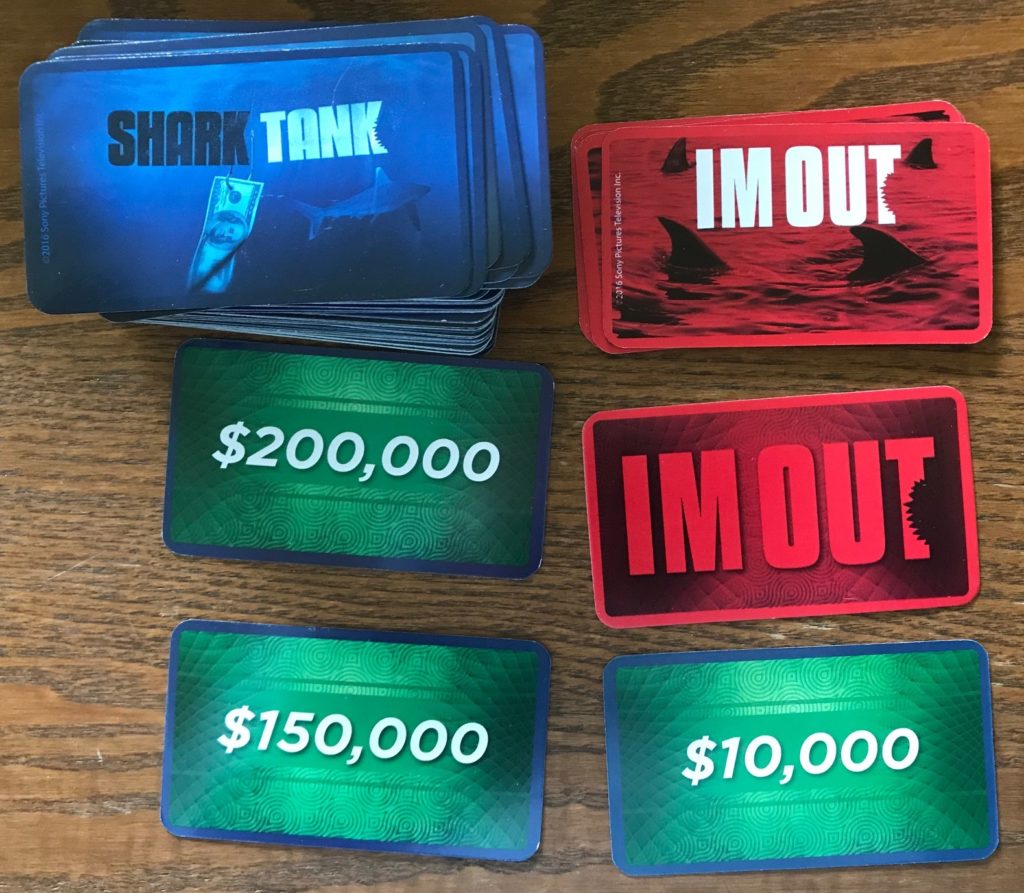
The different companies have different values. When you win a company, roll the die to determine how much the company is worth. The result is represented by placing the corresponding chip on the card. If you are lucky enough to roll BLOCK BUSTER on the die then you are awarded the highest value and you get to draw another money card from the money deck.
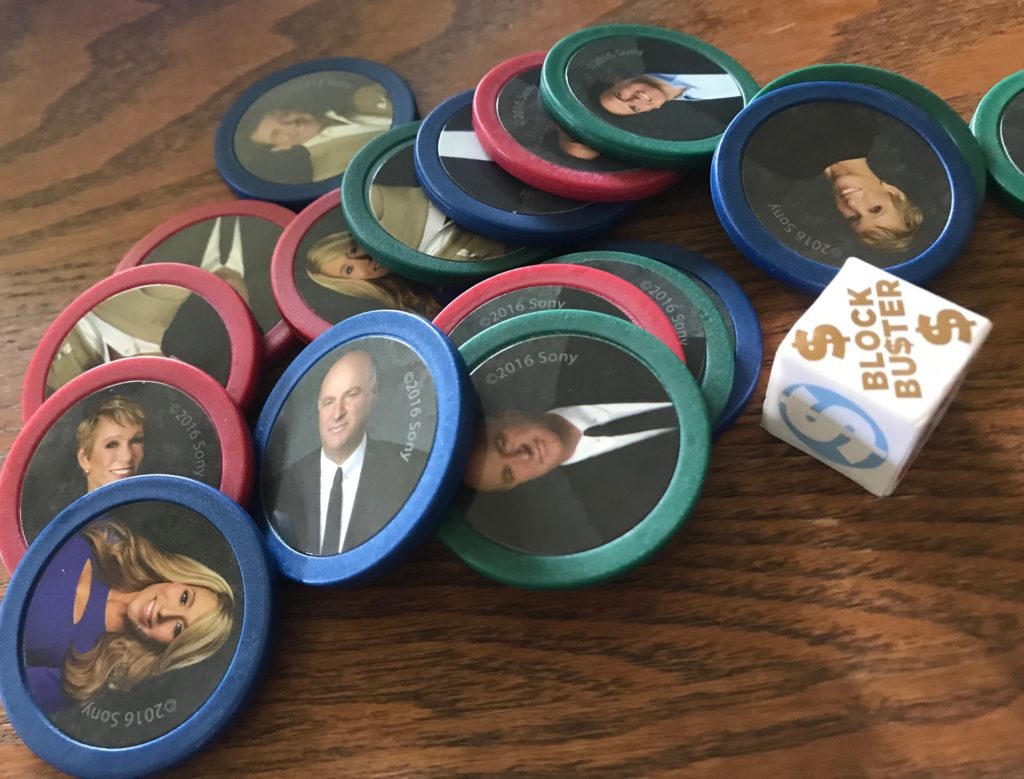
If the company you win corresponds with one of your specialties then you get to draw a money card from the money deck!
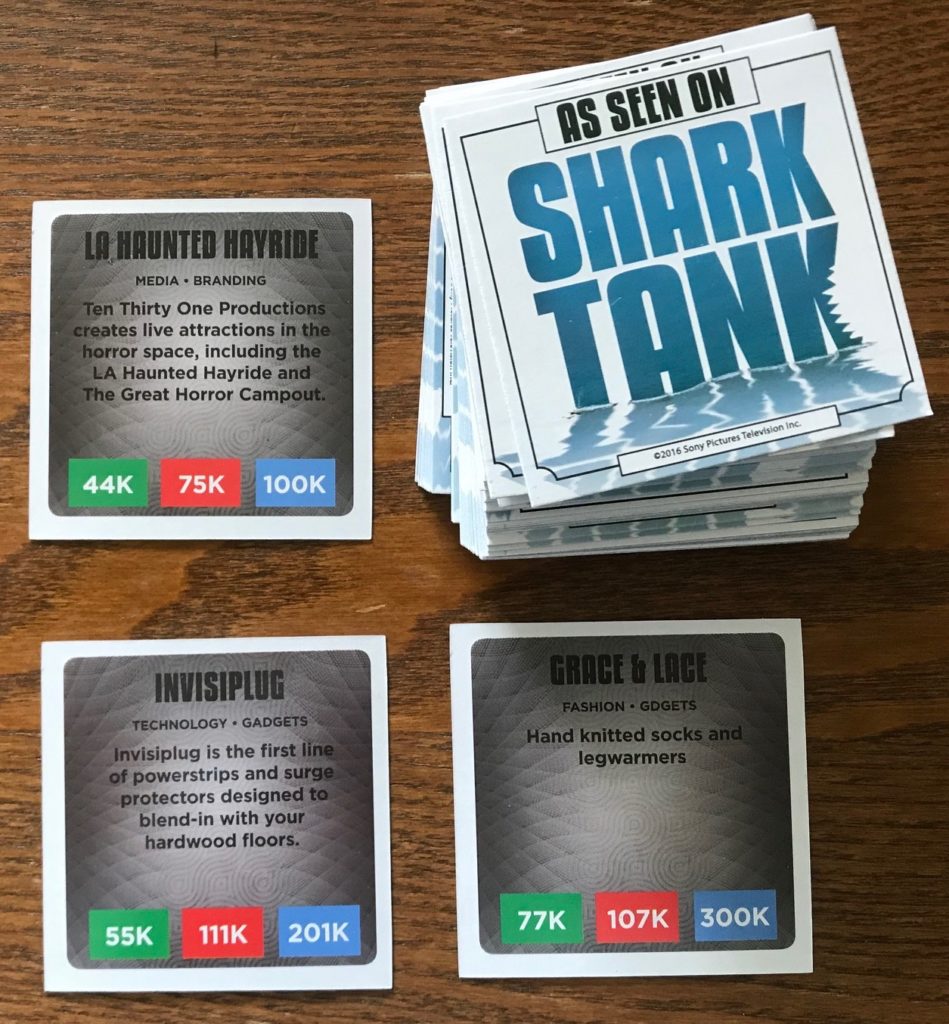
You are allowed to swap companies with other players or even purchase them if you can strike a deal. Any time a company changes hands, the new owner must roll the die to determine the new value of the company. The original roll does not transfer.
Once all 6 company cards have been pitched and purchased, the game is over. Add up the value of all companies you have and half the value of your left over money. The player with the most value wins!
how it went
We played Shark Tank: The Game as a group of three one game night – two of us familiar with Shark Tank and one of us not.
You know I love a good theme. I love how much the game embraces the strong personalities of Shark Tank. There are frequent guest sharks on the show, but the main group has lasted a long time and has a special dynamic. Here is a little bit about my take on them based on no real research but just watching the show:
- Robert: the man loves dogs. He loves them. He does not make a lot of offers but does a good job of keeping the action moving along by reminding the entrepreneurs what offers they have and who is out
- Lori: she is referred to as the Queen of QVC, and I think her offers reflect that. She is looking for a gadget that looks good on TV and a lot of people will buy, but won’t necessarily make the long haul. Kind of everything wrong with the world if you think about it that way
- Barbara: she loves making offers on food ideas and giving hugs to the ones she takes under her wing
- Kevin: aka Mr. Wonderful. My absolute favorite. He is dry, pessimistic and sometimes predatory. The seemingly sharkiest of the sharks. At times he manipulates the whole room. He is also good at reminding entrepreneurs where they stand, but less objectively than Robert
- Daymond: nice guy, not on as much anymore. He does not make a lot of offers, but he shows particular interest in clothing items, where he has a lot of knowledge
- Mark: seemingly beloved by most of those who set foot in the door. He has a soft spot for humanitarian ideas and is quick to praise entrepreneurs on their hard work and clever marketing
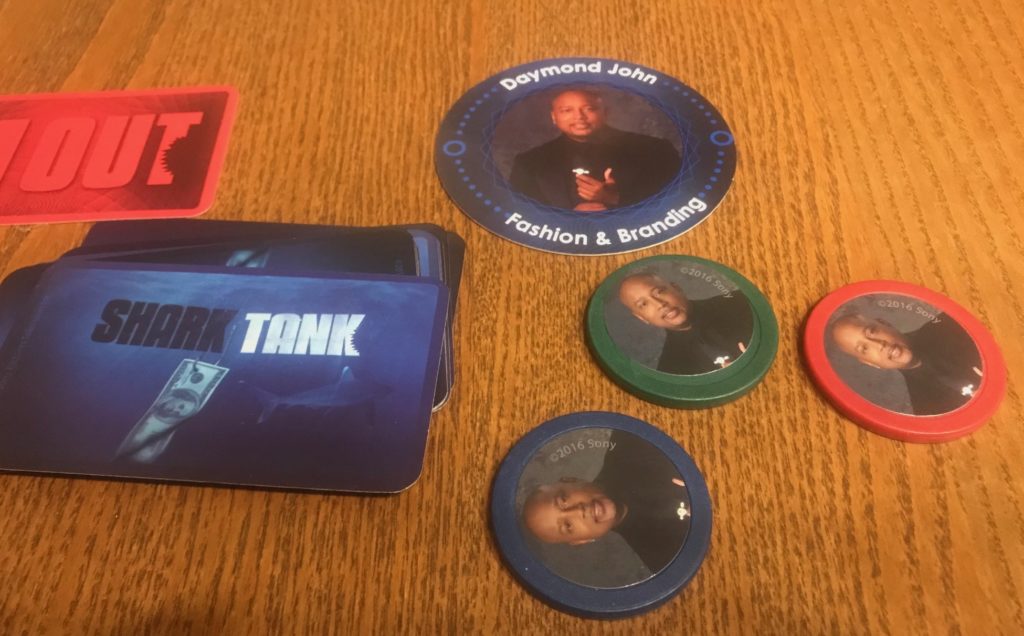
All of the COMPANY CARDS in Shark Tank: The Game come directly from the show, or at least I recognized most of them. So that is kind of fun to reminisce. People get some wild ideas.
There are a few places where my rules leave out important details or are wrong:
- Placing COMPANY CARDS face down: the instructions do not specify to do this, but the whole point of the bidding is that you do not know the value of the company. It is very important that they are face down.
- Green is blue: My instructions repeatedly imply that green is the highest value you can roll, but it’s actually blue on every single card. Perhaps the publisher was blue/green color blind.
- Reader role and its advantage or disadvantage at higher player numbers: The game is supposed to support 2-6 players, but the rules clearly state that the game includes 6 company pitches. The READER role can’t bid on the card they read (I’m assuming this, it’s not in the rules) because they have the secret info. So how do you balance 6 pitches between 4 or 5 players? Will the game balance if you add more pitches, or will everyone run out of money and hate it even more? If you allow the READER to bid, you still get more advantages to some players and not all.
Our play went pretty quickly, with just minor “Wait, what?” issues as we went through the rules. It’s easy to smooth those issues over if you game a lot, but it doesn’t mean they should be there. Bill won Shark Tank: The Game! Keri came in second, and I was a distant third. I probably bid way too much.
play or pass
Pass. I don’t think Shark Tank: The Game captures the spirit of the show, nor does it hold up as a very competent game. I appreciated the blind bidding round since it speeds up bidding, but it feels like a departure from theme. The rules are very poorly done. The game does not seem to have been blind play tested. It’s not painful to play, it’s just kind of nothing. For all of these reasons, I’m out.